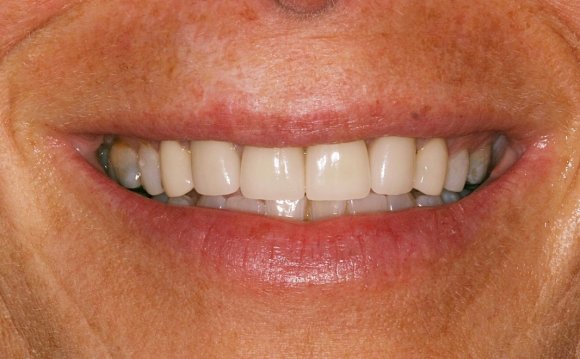
 Considering whitening (bleaching) your teeth? Before you do, discuss the possible risks with your dentist – especially if you plan to whiten your teeth using an at-home bleaching system.
Considering whitening (bleaching) your teeth? Before you do, discuss the possible risks with your dentist – especially if you plan to whiten your teeth using an at-home bleaching system.
Risks associated with tooth whitening include tooth sensitivity and damage to the roots of teeth. Dentists may be able to predict if you will have problems with or sensitivities to the procedure. They also may be able to help you alleviate sensitivity by recommending certain procedures and toothpastes designed to treat sensitive teeth. Dentists can also check for signs of root damage caused by tooth whitening and treat the condition if detected in time.
Tooth coloration
Why do teeth change color and become darker or more yellow? The internal portion of teeth normally darkens over time. In addition, personal habits – such as tobacco use or drinking coffee, tea or wine – can cause staining. Certain medications also can discolor teeth.
Teeth cleaning by your dental office can often remove any external stains – and it promotes good oral health. Be sure to visit your dentist for a thorough cleaning and examination before you decide to whiten your teeth. You may find that a professional cleaning is all it takes to give you a whiter, brighter smile.
To bleach or not to bleach?
Generally, tooth whitening is successful in at least 90 percent of patients. As a rule of thumb, yellow-colored teeth respond well to whitening, while brownish-colored teeth don’t respond as well. Gray stains caused by smoking, taking tetracycline or fluorosis (ingestion of too much fluoride) most likely will not be dramatically changed by tooth whitening.
Likewise, tooth whitening may not enhance your smile if you’ve had bonding or tooth-colored fillings placed in your front teeth. The whitener will not affect the color of these materials, and they will not match your newly whitened smile. In these cases, you may want to investigate other options, such as porcelain veneers or dental bonding on other teeth.
Is bleaching a good option for you?
Before you decide to whiten your teeth, here are some issues to consider:
- What does your dentist advise? Not all stains can be lightened by over-the-counter or professional bleaching, and your dentist will be able to give you guidance. If you have sensitive teeth, gum disease or teeth with worn enamel, your dentist may discourage tooth whitening.
- Is bleaching worth the cost? Tooth whitening procedures in the dental office are not typically covered under Delta Dental plans. Always check your specific plan coverage before undergoing any dental procedure or treatment.
- Should you have professional treatment or use an at-home bleaching system? Bleaching can be performed by your dentist in the office or at home. (The Academy of General Dentistry recommends dentist supervision for any whitening treatment, even over-the-counter preparations.) Although over-the-counter treatments are less expensive, they may require a longer treatment period, and the risks of gum irritation or damage to previous dental work are increased. If you want quicker and more reliable results, you should ask your dentist about in-office whitening or laser whitening. In-office whitening may require more than one visit to the dentist's office. Results from a dentist-supervised whitening procedure can last anywhere from one to five years (depending on your eating, drinking or smoking habits).
Whether or not you decide to whiten your teeth, keep in mind that good daily oral health habits like brushing and flossing and regular checkups and cleanings go far in keeping your smile bright and healthy.
Information courtesy of the Delta Dental Plans Association, the Academy of General Dentistry and the American Dental Association.The oral health information on this website is intended for educational purposes only. You should always consult a licensed dentist or other qualified health care professional for any questions concerning your oral health.









